Brussels sprouts - how to grow and what are its benefits
Ever since childhood, I remember the nasty taste of Brussels sprouts, which my parents tried to feed me. I know that many children and adults are very skeptical about this type of cabbage, since it has such a taste that not everyone likes it.
However, it has long been known that Brussels sprouts are simply a storehouse of nutrients and vitamins. Perhaps you just need to learn how to cook it deliciously!
Of course, you can buy both fresh and frozen cabbage in our stores, but you always want to eat vegetables that are grown in the right conditions, or even better, do it yourself. At this point, you will surely know that various harmful substances have not got into the heads of cabbage.
What is Brussels sprouts
This plant was obtained by selection from collard greens. This vegetable came to our latitudes only in the middle of the 19th century.
A feature of this type of cabbage is that not one head of cabbage is formed on the plant, but many small (about the size of a walnut) heads of cabbage. They are formed in the axils of the leaves and look very interesting when there are 30-70 of them on one stem!
Growing cabbage in the garden
Brussels sprouts have not yet gained popularity among gardeners so much, therefore you will not often find it in the beds. But those who grow it do not see any particular difficulties in obtaining a rich harvest.
Soil requirements
For planting this type of cabbage, it is better to choose light, loose, loamy soils, saturated with organic fertilizers. If your soil is in an area with high acidity, then you should not expect a good harvest from cabbage. The soil will need to be cultivated to adjust the pH level to a suitable one for Brussels sprouts.
Cabbage grows very well in those beds where cucumbers, onions, beets, tomatoes, potatoes, and various legumes grew before it.
Seedling
- It is recommended to grow Brussels sprouts through seedlings, since the growing season for plants is quite long - 160-180 days.
- Seedlings can already be planted in open ground when they reach 35-45 days of age. During this period, the sprouts have time to get stronger, they already have several leaves.
- The roots of cabbage sprouts are rather tender, therefore, when transplanting into the soil in the garden, it is better to plant seedlings with an earthen clod from seedling pots or a container.
- The seedlings can be buried a little deeper than they were planted by tearing off a couple of lower leaves.
- It is not necessary to huddle the plants then, but it is necessary to loosen and remove weeds.
- When the plants start to grow in a permanent place, you can arrange for them to be fed with complex fertilizer.
- It is recommended to plant seedlings according to the scheme 60x60 cm, since cabbage needs good lighting for the formation of heads of cabbage.
Adult plant care
Brussels sprouts are able to survive frosts down to -10 degrees, which differs from most of their relatives. A light frost even enhances the taste of her heads of cabbage. But although this bush is not considered a whimsical plant, it is not necessary to expect a harvest from it quickly.
It is worth watering this type of cabbage in moderation, but at the same time, it is impossible to allow the soil to dry out strongly.
The growth of Brussels sprouts is rather slow, therefore, between the beds with it, you can simultaneously grow cucumbers, tomatoes, and other early vegetables. Such a neighborhood is only good for cabbage.
It is very important in late August - early September to break off the top of the plants. This is done at the moment when the lower heads of cabbage reach the size of about a pea. Such a technique is necessary so that all the forces of the plant go to the formation of heads, and not to the growth of the stem.
The crop is usually harvested at the end of September, but if the heads of cabbage have not yet fully developed, you can postpone it. This cabbage is not afraid of frost, therefore it can grow until November.
The benefits of Brussels sprouts
Small heads of cabbage are literally stuffed with useful substances and raw protein, which is not inferior in properties to meat protein.
In addition, Brussels sprouts overtake white cabbage in terms of vitamin C content: it contains three times more, which is comparable to black currant berries.
Cabbage fruits are rich in vitamins PP, A, B1, B2, and the content of riboflavin in them is close to dairy products.
Pregnant women are highly advised to eat Brussels sprouts as they are an excellent source of the much needed folic acid.
It is recommended to include this cabbage in the diet for people with heart disease and those suffering from hypertension and arrhythmia. Even the broth contains so many nutrients that it can be equated with chicken in terms of nutritional value.
Brussels sprouts strengthens the immune system, increases the vitality of the body and has a general strengthening effect.



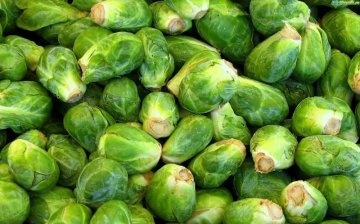
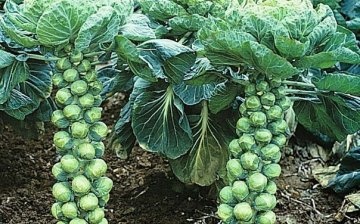
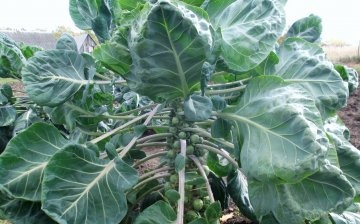



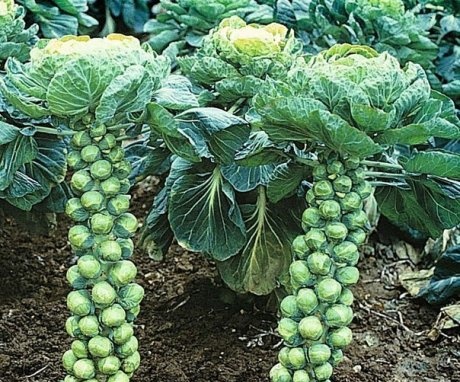
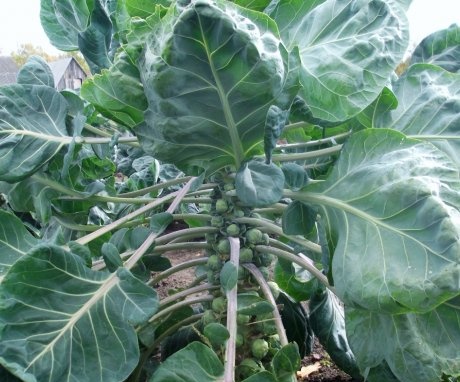
In vegetable gardens, it is practically not grown. Proof of this is that no grandmother in the market sells Brussels sprouts. But in stores there is a lot of it.
I never found Brussels sprouts to taste nasty. On the contrary, she was always delighted with her. Apparently, it all depends on the method of preparation. True, I did not try to grow it, I am content with the one that is for sale.
everyone has different taste preferences) I know a lot of people who cannot just eat this cabbage, how not to cook it.